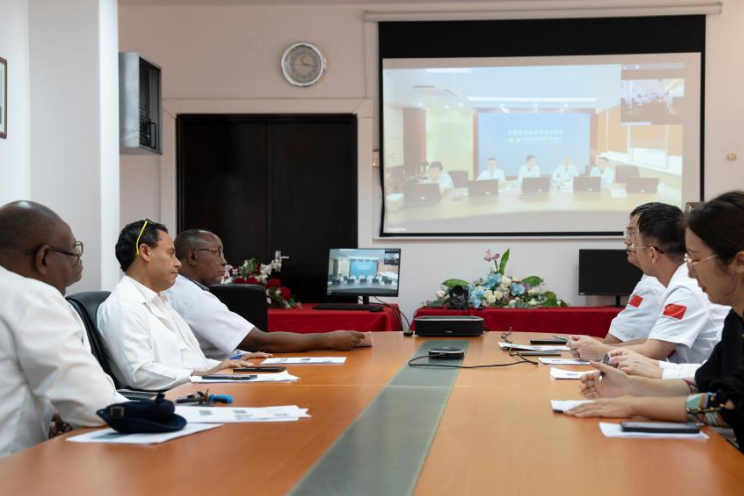NIH funding cuts disrupt research


Hardeep Singh, a professor at Baylor College of Medicine in Houston, moved to the United States from India to conduct medical research about three decades ago.
"Most of my research was inspired by my clinical practice, which started in rural East Texas, where I was a practicing primary care doctor," Singh said in a recent online discussion about NIH funding cuts, organized by the Center for American Progress (CAP). "I saw a lot of patients that had a missed and delayed diagnosis. That's when I found out how common a problem this diagnosis was."
Singh applied for a grant from the National Institutes of Health (NIH) and jump-started his research career in patient safety. He is the co-chief at Health Policy, Quality & Informatics Program (HPQI), a research center under the umbrella of multiple medical and governmental agencies.
His research focuses on reducing medical errors and improving healthcare quality. "We've been able to influence guidelines of several national agencies, CMS (the Centers for Medicare and Medicaid Services), CDC, international agencies, WHO, OECD (the Organization for Economic Co-operation and Development)," he said.
He has won numerous awards and honors for his contributions to patient safety, including the 2012 Presidential Early Career Award for Scientists and Engineers, from former president Barack Obama.
Singh said his research is important because 1 out of every 20 US adults could be misdiagnosed every year in the outpatient setting alone. His research produces intervention solutions for health systems, clinicians and also patients to get involved in reducing misdiagnosis.
"We're studying things like artificial intelligence. How do you make sure that AI is delivered safely and effectively to everybody who needs it," he said.
However, HPQI will undergo a 90 percent budget cut under the Trump administration, "which pretty much eliminates the agency that has funded my entire life to work" and, "HPQI will cease to exist as it exists now," he said.
Singh is not alone.
Michael Lin, a professor of neurobiology and bioengineering at Stanford University, is an investigator in one of the nine AViDD (Antiviral Drug Discovery Centers for Pathogens of Pandemic Concern) set up by the NIH in 2022.
According to the NIH website, AViDD Centers "will conduct innovative, multidisciplinary research to develop candidate COVID-19 antivirals, especially those that can be taken in an outpatient setting, as well as antivirals targeting specific viral families with high potential to cause a pandemic in the future".
Lin said he's not sure where the decisions were made, but all nine AViDD Centers had their funding immediately canceled recently.
Lin said the AViDD centers were allocated $300 million over three years, and the work is nearing its end. Stopping the project now will save little money out of NIH's overall $50 billion budget, he said.
With the grant being canceled, work already done will be lost.
"All of these centers had a very fast speed and developed a promising pipeline of drugs, and they were all in the last stages of testing those drugs," Lin said. "If the centers cannot do the final step of validating that these drugs work, then the money of the taxpayers that already (was) spent is going to go to waste. On top of that, you won't have the results that could be lifesaving in the future."
Lin said the public may not feel the impact of the cuts at all right now, "but you can be pretty sure that at some point in your life, you or someone you know is going to benefit from a drug or would have benefited from a drug that might be being cut right now".
"It's going to be a problem that will have ramifications down the road five or 10 years later," Lin said.
The impact is extensive, according to Howard Forman, a professor at Yale University.
"Recently, 1,200 employees of the NIH have been fired or otherwise removed, including some of the most senior leaders of these centers, leaving them without any type of a deep bench which they previously had. And matching this, the FDA has also seen massive firings and an exodus of our best talent," Forman said, adding that the NIH was ordered to "reduce contract spending by 35 percent, or $2.6 billion".
Forman said that NIH funding is extraordinarily important to innovation and the life sciences industry in the United States. He pointed toward a paper published on JAMA in 2023 showing "that 99.4 percent of all approved drugs from 2010 to 2019, that's basically all but two of 356 drugs approved during that time benefited from NIH-funded research".
Lin said that it costs about $2 billion to develop a drug in the private sector, while NIH-funded research produces a drug at $380 million due to different salary levels in the two sectors. NIH-funded research is a much more efficient way to get beneficial results.
With the current funding cut, the US will lose talent, he said.
"France has been trying to recruit away American scientists to their universities. So, these kinds of cuts do have an effect on how people judge their future careers. And they do put us in a less competitive position versus other countries," Lin said.

































